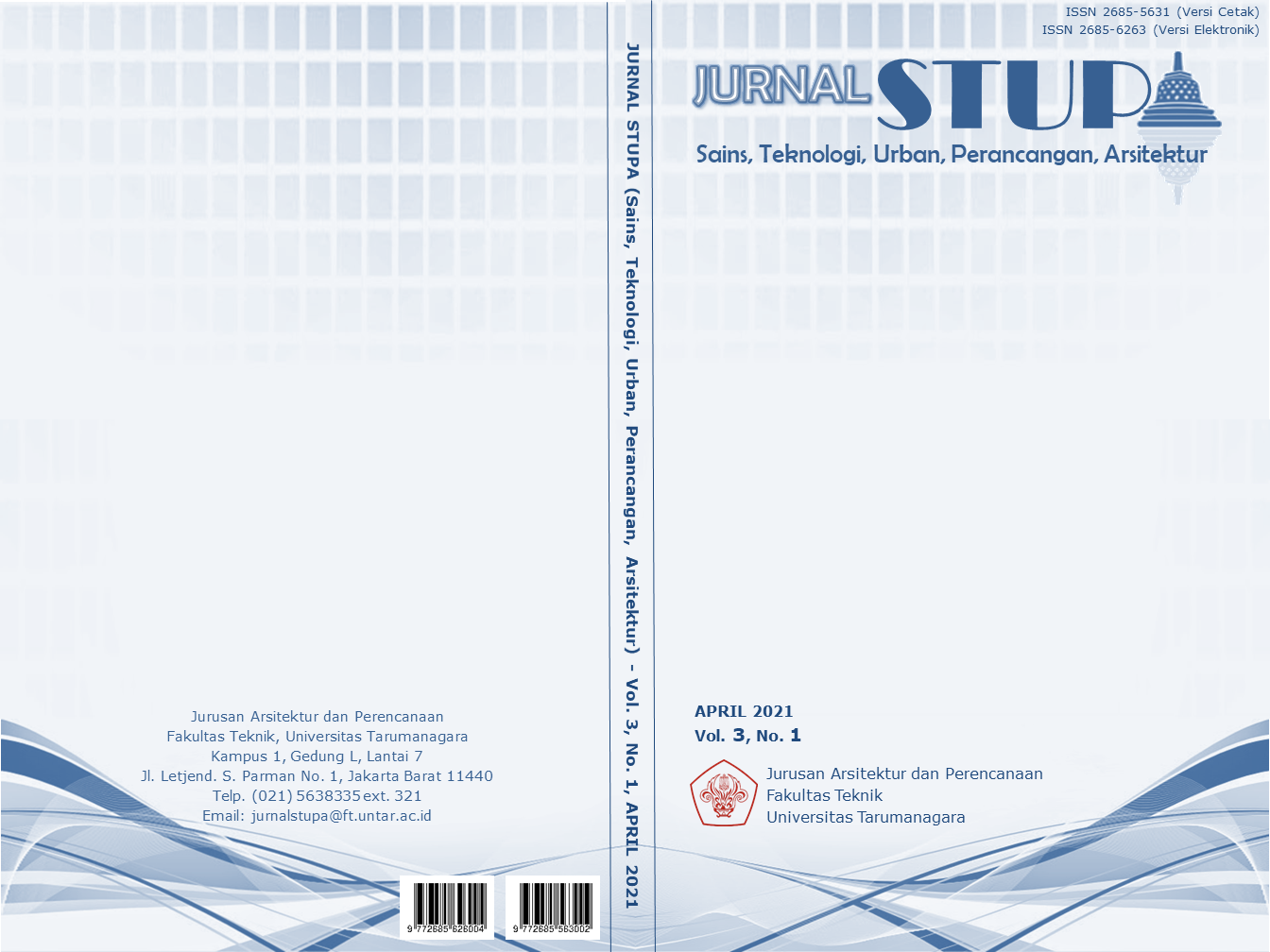HUNIAN KOMUNAL KOOPERATIF TB SIMATUPANG
Main Article Content
Abstract
Our lifestyle and work patterns are undergoing changes. One of them is the implementation of the Work From Home (WFH) system which is triggered by the spread of the Covid-19 pandemic that is sweeping the world. WFH was considered as one of the most effective steps to reduce the spread of the pandemic. However, WFH also has shortcomings which cannot facilitate the work process optimally, both physically and psychologically. In this day and age, the boundaries between working and living are slowly fading away and are no longer distinctly separate. Work or live activities no longer require their respective spaces, but can also be done in the same space. In connection with the concept of future dwelling, the public-private blurring character can be an important point that is fit with the characteristics of future residents (millennial generation workers) who are more concerned with quality than quantity of space. The method used is a qualitative descriptive analysis method which goes through several stages starting with the identification of issues, the search for theory and literacy, data analysis, and the formation of design concepts. This project is designed as a form of a new typology of work, based on the characteristics of Work, Play & Live that specially designed for the millenials. The Co- Dwell is a cooperative communal housing project that can accommodate and facilitate creative digital workers, who also develop along with the booming gig economy trend. This project is designed to become an embryo for the development of future work-live facilities.
Keywords: blurring public-private; new work-live typology; WFH; Work-Play-Live
Abstrak
Pola hidup dan pola bekerja kita sekarang ini telah mengalami perubahan. Salah satunya adalah penerapan sistem Work From Home (WFH) yang dipicu oleh adanya penyebaran pandemi Covid-19 yang melanda dunia. WFH dinilai sebagai salah satu langkah paling efektif untuk menekan penyebaran pandemi. Namun, WFH juga memiliki kekurangan seperti tidak dapat memfasilitasi proses bekerja secara maksimal, baik secara fisik maupun psikologi. Pada masa sekarang ini, batasan antara bekerja dan berhuni perlahan memudar dan tidak lagi nyata terpisah. Kegiatan bekerja maupun berhuni tidak lagi membutuhkan ruang tersendiri, namun bisa juga dilakukan dalam satu ruang yang sama. Berhubungan dengan konsep berhuni masa depan, karakter blurring public-private ini bisa menjadi poin penting yang dianggap sesuai dengan karakteristik penghuni masa depan (generasi milenial) yang lebih mementingkan kualitas dibanding kuantitas ruang. Metode yang digunakan adalah metode analisis deskriptif kualitatif yang melalui beberapa tahap dimulai dengan identifikasi isu, pencarian teori dan literasi, analisis data, serta pembentukan konsep perancangan. Proyek ini dirancang sebagai bentuk tipologi baru berhuni-bekerja dengan dasar karakteristik Work, Play & Live yang dirancang khusus bagi pekerja generasi masa depan. The Co-Dwell merupakan suatu proyek hunian komunal kooperatif yang dapat menampung dan memfasilitasi kebutuhan khususnya para pekerja digital kreatif yang ikut berkembang seiring dengan maraknya tren gig economy. Proyek ini dirancang bertujuan untuk menjadi embrio bagi perkembangan fasilitas berhuni-bekerja masa depan.
Article Details
Section
References
Austronaldo F.S. (2012). Mind dan Dwelling. Studi Kasus: Dua Dwelling Keluarga Batak di Jakarta Timur.
Heidegger, M. (1971). Building Dwelling Thinking. Dalam Poetry, Language, Thought (pp.145- 161). New York: Harper & Row Publisher, Inc.
Mitchell W. (2012). The Museum of Me. Victoria University of Wellington
Norberg-Schulz, C. (1985). The Concept of Dwelling: On the way to figurative architecture. New York: Rizzoli International Publication, Inc.
Raymond J Colea & Daniel Pear (2007). Blurring Boundaries in the Theory and Practice of Sustainable Building Design.
Tarwiyani, T. (2016). Teknologi dan Tipe Masyarakat dalam Perspektif Gerhard E. Lenski, Sebuah Tinjauan Filsafat Sejarah. 10. 16-17.
Wolford, R. (2008). Wandering in Dwelling. Washington State University

